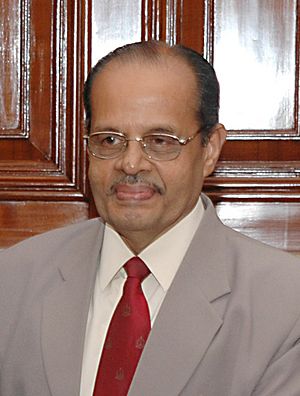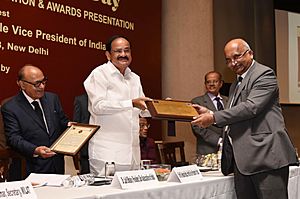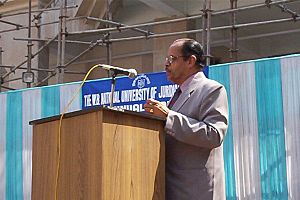N. R. Madhava Menon facts for kids
Quick facts for kids
N. R. Madhava Menon
|
|
|---|---|

Menon in August 2007
|
|
| Born | 4 May 1935 |
| Died | May 8, 2019 (aged 84) Thiruvananthapuram, Kerala, India
|
| Other names | Appu |
| Alma mater | Government Law College, Trivandrum |
| Occupation | Legal educator, lawyer |
| Years active | 1956–2019 |
| Known for | Founding the National Law School of India University and the West Bengal National University of Juridical Sciences |
| Spouse(s) | Rema Devi |
| Children | Ramakrishna Menon |
| Parent(s) | Ramakrishna Menon (Father) Bhavani Amma (Mother) |
| Awards | Padma Shri (2003) Padma Bhushan (2020) Living Legend of Law Plaque of Honour Rotary Club Award for Vocational Excellence |
| Signature | |
 |
|
Neelakanta Ramakrishna Madhava Menon (born May 4, 1935 – died May 8, 2019) was a very important Indian lawyer and teacher. Many people call him the "father of modern legal education" in India. He helped create a new way of teaching law in the country.
Menon started the National Law Universities system. He was also the first director of the National Law School of India University (NLSIU). He also led the National Judicial Academy in Bhopal. Later, he became the first vice-chancellor of the West Bengal National University of Juridical Sciences (NUJS).
The Government of India honored him with the Padma Shri award in 2003. He also received the Padma Bhushan award in 2020 after his death. He was a member of many important committees. These committees worked on improving legal aid, civil services, and criminal justice in India.
Contents
About His Life
Menon was born on May 4, 1935, in Thiruvananthapuram, Kerala. He was the fourth of six children in his family. His father was a law graduate who worked for the government. Sadly, his father died when Menon was only two years old. His mother, Bhavani Amma, raised him and his siblings with help from her family. She took a job as a clerk to support them. At home, he was lovingly called "Appu."
His Education Journey
Menon went to SMV High School, Thiruvananthapuram. He finished high school in 1949. After that, he studied at S. D. College, Alappuzha. He earned a science degree in zoology in 1953. He also learned Hindi at the same time.
He then decided to study law. He first went to Government Law College, Ernakulam. Later, he moved to Government Law College, Thiruvananthapuram. He finished his law degree (BL) in 1955.
Menon passed away on May 8, 2019, just four days after his 84th birthday. He died in Thiruvananthapuram after battling liver cancer.
His Career and Work

Starting in Law and Government
Menon began his career in 1955. He worked as an apprentice for a lawyer for about a year. In 1956, he became a registered lawyer in Kerala. He started practicing law in Thiruvananthapuram.
A year later, he took the Civil Services Examination. He got a job in the Central Secretariat Service in New Delhi. This was a government job. He took this job based on advice from his teacher, A.T. Markose.
While working, Menon continued his studies. He earned a master's degree (MA) in political science in 1960. Then, he studied law further at Faculty of Law, Aligarh Muslim University. He got another master's degree in law (LLM). He also did research on "White Collar Crime" and earned his PhD in 1965. He was the first person to get a PhD from the Faculty of Law at Aligarh Muslim University. In the same year, he married Rema Devi.
Becoming a Legal Educator
In 1968, Menon became a professor at Faculty of Law, Aligarh Muslim University. Later, he moved to the University of Delhi as a professor. During this time, he received a special scholarship called the Fulbright Scholarship. This allowed him to present a paper on "Legal Aid" in California, USA.
He also worked with top American universities like Harvard and Columbia. He published his first book, Law Relating to Government Control Over Private Enterprise. He also wrote another book, Law and Property.
Menon was very active in the legal teaching community. In 1972, he became the Secretary General of the All India Law Teachers Association. He also worked on committees for legal aid.
In the early 1980s, the Bar Council of India wanted to start a new kind of law school. Menon was chosen to lead this project. He helped set up the National Law School of India University (NLSIU) in Bangalore. This school was the first in India to use the Harvard Law School's case study method. This method teaches students by looking at real court cases. It soon became a popular way to teach law in India. Menon worked at NLSIU for twelve years as its director.
In 1998, the Government of West Bengal asked Menon to create another law university. He set up the West Bengal National University of Juridical Sciences (NUJS). He was its first vice-chancellor until 2003. After that, the Supreme Court of India asked him to become the first director of the National Judicial Academy. This academy trains judges. He worked there until he retired in 2006.
Work After Retirement

Even after retiring in 2006, Menon continued to work for the government. He was a member of the Commission on Centre-State Relations until 2010. He also served as Chairman of the Indian Statistical Institute in Kolkata. Later, he chaired the Centre for Development Studies in Thiruvananthapuram.
He led a government committee that wrote the National Policy on Criminal Justice. He was also a member of the Law Commission of India. He worked on committees to improve higher education and criminal justice. In 2014, he headed a commission for the Supreme Court. This commission made recommendations on government advertisements.
Menon was also involved with international legal groups. He advised the Commonwealth Judicial Education Institute in Canada. He founded a non-profit organization called Menon Institute of Legal Advocacy Training (MILAT). This group promotes human rights and judicial reforms.
He was the Chancellor of Guru Ghasidas University in Bilaspur, India. He was also a member of several other university boards. Menon lived in Thiruvananthapuram with his wife, Rema Devi. They had one son, Ramakrishna, who is an engineer.
Awards and Honors
Menon received many awards for his great work. In 1994, the International Bar Association gave him the Living Legend of Law Award. He also received the Rotary Club Award for Vocational Excellence. The Bar Council of India honored him with a Plaque of Honour.
In 2001, the National Law School of India University gave him an honorary Doctor of Law degree. He was also a Fellow of the American Council of Learned Societies and Columbia University. The Government of India awarded him the Padma Shri in 2003. This is one of India's highest civilian awards. In 2020, after his death, he was given the Padma Bhushan for his contributions to public affairs.
His Lasting Impact
Menon's work had a huge impact on legal education in India. He helped create two major law schools: the National Law School of India University in Bengaluru and the West Bengal National University of Juridical Sciences in Kolkata.
He came up with the idea of a five-year integrated LLB course. Before this, law students took a three-year course after their first degree. His teaching style, called the Socratic method, was also new. This method involved students actively discussing legal problems. He also encouraged "legal clinics," where students could get practical experience.
The Menon Institute of Legal Advocacy Training (MILAT), which he founded, continues his work. It helps promote human rights and improve the justice system. It also provides advanced training for lawyers.
See also
- National Law School of India University
- National Judicial Academy
- West Bengal National University of Juridical Sciences
- Indian Statistical Institute
- Centre for Development Studies
- Law Commission of India
 | Claudette Colvin |
 | Myrlie Evers-Williams |
 | Alberta Odell Jones |


